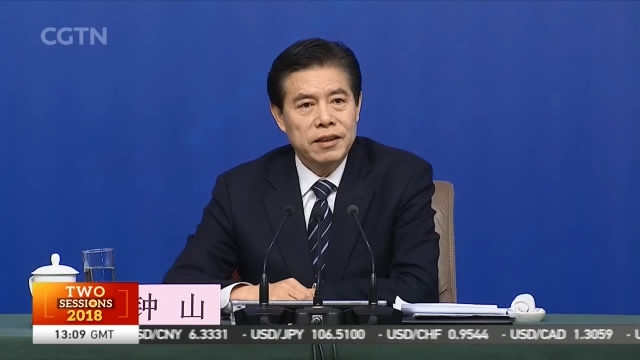
21:42, 20-Mar-2018
China's Political Season: Institutions unveil economic roadmap

2018 will be a crucial year for China's economic reform and several ministries have unveiled strategies to deal with challenges in such areas as trade and taxes.
Maintaining a neutral monetary policy and defusing financial risks are on top of the central bank's to-do list. Newly elected PBOC governor Yi Gang said that China would maintain its current monetary policies, control the money supply and continue credit and social financing growth at a reasonable pace. Yi also emphasized advancing financial reforms, such as the marketization of interest rates. Yi also said that the central bank should reduce intervention in the forex market and let the market decide exchange rates to make the financial system more resilient to external shock.
Trade is another pillar of China's economy. The Ministry of Commerce said China would seek high quality trade through innovation.
ZHONG SHAN, MINISTER MINISTRY OF COMMERCE "China is already a major trading country, the conclusion is based on the following that China's consumption, foreign trade, inbound FDI and outbound FDI have all ranked among the top in the world, but we still should be aware that China is a major trading power but not a quality trader, and to be a high quality trader, we must be committed to the principle of being guided by innovation and we must embark on the path of high-quality development."
The ministry has also elevated the role of consumption in boosting overall national economy. The ministry said China would open wider to the outside in such areas as healthcare, education, and new energy. The ministry said that China is also committed to introducing high-tech services, including big data, cloud computing and AI, to belt and road countries.
Meanwhile, the Finance Ministry said it would maintain a proactive fiscal policy and advance tax reforms. The ministry said the government would continue to cut corporate taxes, especially for small- and medium-sized companies. The ministry said that China would also lower the broad tax rate for such sectors as manufacturing and transportation. The ministry also warned that it would keep an eye on local government debt to fend off risks.

SITEMAP
Copyright © 2018 CGTN. Beijing ICP prepared NO.16065310-3
Copyright © 2018 CGTN. Beijing ICP prepared NO.16065310-3